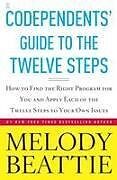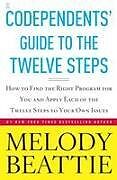Codependents' Guide to the Twelve Steps
Einband:
Kartonierter Einband
EAN:
9780671762278
Untertitel:
New Stories
Genre:
Psychologie & Esoterik
Autor:
Melody Beattie
Herausgeber:
Touchstone Books
Anzahl Seiten:
224
Erscheinungsdatum:
09.04.1992
ISBN:
978-0-671-76227-8
Provides a detailed explanation of the Twelve-Step program designed by Alcoholics Anonymous, accompanied by advice on how to apply the program to codependent issues and cross-addiction
Autorentext
Melody Beattie ha escrito numerosos libros sobre el crecimiento y las relaciones personales, y su mensaje se basa en la sabiduría curativa de los Doce Pasos, el cristianismo y las religiones orientales. Con la publicación en 1986 de Ya No Seas Codependiente, Melody se convirtió en una de las principales voces de la literatura de autoayuda cautivando a millones de lectores empeñados en tener relaciones más sanas. Ella vive en Malibu, California.
Klappentext
New from the bestselling author of Codependent No More and Beyond Codependency--the important guide to using the Twelve Steps specifically for codependent issues. Includes tips on how to evaluate programs, a practical guide to each of the Twelve Steps, plus specific exercises and activities to use both in group settings and on one's own.
Zusammenfassung
Interpreting the 12 Steps for people involved in codependent, unsatisfying relationships, this book includes a comprehensive directory of fellowships and support groups that deal with codependency issues.
Leseprobe
Chapter 1
"Surrender happens of its own accord. It just dawns on me.
Then, peace of mind settles in, and my life starts to get more manageable."
Bob T.
STEP ONE
"WE ADMITTED WE WERE POWERLESS OVER OTHERS-THAT OUR LIVES HAD BECOME UNMANAGEABLE."
Step One of CoDA
The first time I heard this Step, I didn´t get it. I didn´t understand. It felt dark, scary, and untrue.
Powerless over others? My life -- unmanageable?
I thought I was in complete control of myself and others. I thought there was no circumstance too overwhelming, no feeling so great that I couldn´t handle it by sheer force of willpower. I thought being in control was expected of me. It was my job. That´s how I got through life!
And I thought my life looked so much more manageable than the lives of those around me -- until I started looking within. That´s when I found the undercurrent of fear, anger, pain, loneliness, emptiness, and unmet needs that had controlled me most of my life.
That´s when I took my eyes off the other person long enough to take a look at the state of affairs in my life.
That´s when I began to find a life and come alive.
"I didn´t know about power and powerlessness," said Mary, talking about the First Step. "Being a victim and being in control was how I was in power. If I was powerless, then someone else was in control."
Now we are learning a better way to own our power than being victims and being controlling. It begins by admitting and accepting the truth about ourselves and our relationships.
We are powerless over others. When we try to exert power where we have none, our lives at some level may become unmanageable. Let´s take a look at some ways unmanageability can present itself in our lives, and where our ideas about controlling others -- or allowing them to control us -- began.
MY STORY
I can still remember the scene vividly, even though it happened more than a decade ago. Someone I cared about a lot was drinking. He was an alcoholic. And he wouldn´t stop. I had done everything I could to make him stop. Nothing worked.
Nothing.
Neither was I able to stop my efforts to control his drinking. After yet another round of promises, forgiveness, then broken promises, I settled on the ultimate plan to make him stop drinking. I would show him how it felt to love someone who was using chemicals. I would make it look like I had returned to drug usage. That would get his attention. That would show him how much I hurt. Then he would stop.
Carefully, I set the stage. Although I had been clean of drugs for years, I laid out the paraphernalia of a user: a small packet with white powder in it (I used sugar); a spoon, burnt on one side; a piece of cotton in the spoon. Then I lay down on the couch to make it look like I was under the influence of narcotics.
A short time later, the person who was the focus (at that time) of my control efforts entered the room. He looked around, saw the spoon, saw me, and started to react. I jumped off the couch and started lecturing.
"See!" I screamed. "See how it feels to love someone and see them using chemicals! See how much it hurts! See what you´ve been doing to me for these years!"
His reaction was not nearly as important as my neighbor´s reaction later that evening. "What you´re doing is really crazy," she said, "and you need to go to Al-Anon."
It took me months to learn the truth: I didn´t need to prove to the alcoholic how much I hurt. I needed to become aware of how much pain I was in. I needed to take care of myself.
That´s only one of many incidents that shows the lengths I went to to control people. I was so good at seeing the behaviors, especially the out-of-control behaviors, of another. Yet I couldn´t see unmanageability in my own life. I couldn´t see myself. And I was trapped, locked into the victim role. People didn´t just do things. They did things to me. No matter what happened, each event felt like a pointed attempt to do me in.
My ability to separate myself from others -- to separate my issues, my business, my affairs, and my responsibilities from the issues, business, affairs, and responsibilities of others -- was nonexistent, I blended into the rest of the world like an amoeba.
If someone needed something, I considered that need my personal and private responsibility, even if I was just guessing about what he or she needed. If someone had a feeling, it was my responsibility to work through it for him or her. If someone had a problem, it was mine to solve.
I didn´t know how to say no. I didn´t have a life of my own. I had a backlog of feelings from childhood, and chances were great that whatever I was reacting to today was probably a patterned reaction from childhood. Two weeks after I got married, I raced home from work, flung open the closet doors, and checked to see if my husband´s clothes were still in the closet. I was certain I was going to be abandoned, left. I felt totally unlovable. And I didn´t have the foggiest idea what it meant to own my power.
The base I operated from was fear, coupled with low self-esteem. I spent most of my time reacting to other people, trying to control them, allowing them to control me, and feeling confused by it all.
I thought I was doing everything right. Aren´t people supposed to be perfect? Aren´t people supposed to be stoic? Shouldn´t we keep pushing forward, no matter how much it hurts? Isn´t it good to give until it hurts, then keep giving until we´re doubled over in pain? And how can we allow others to go about their life course? Isn´t it our job to stop them, set them straight? Isn´t that the right way, the good way, the Christian way?
The codependent way.
As many others have said about themselves, I wasn´t me. I was whoever people wanted me to be, And I felt quite victimized and used up by it all. After years of practicing hard-line codependency, the unmanageability in my life was overwhelming. Some of my codependency I didn´t understand until well into recovery.
When I began recovery I was more than $50,000 in debt, as a result of the unmanageability in my financial affairs. No amount was too great to be borrowed if it would help someone else.
My spirituality had been taxed to the limit. How many times had I prayed for God to change other people? How often had God refused? I thought God had abandoned me. I didn´t know that I had abandoned myself. I didn´t know …

Leider konnten wir für diesen Artikel keine Preise ermitteln ...
billigbuch.ch sucht jetzt für Sie die besten Angebote ...
Die aktuellen Verkaufspreise von 6 Onlineshops werden in Realtime abgefragt.
Sie können das gewünschte Produkt anschliessend direkt beim Anbieter Ihrer Wahl bestellen.
Loading...
Die aktuellen Verkaufspreise von 6 Onlineshops werden in Realtime abgefragt.
Sie können das gewünschte Produkt anschliessend direkt beim Anbieter Ihrer Wahl bestellen.
| # | Onlineshop | Preis CHF | Versand CHF | Total CHF | ||
|---|---|---|---|---|---|---|
| 1 | Seller | 0.00 | 0.00 | 0.00 |
